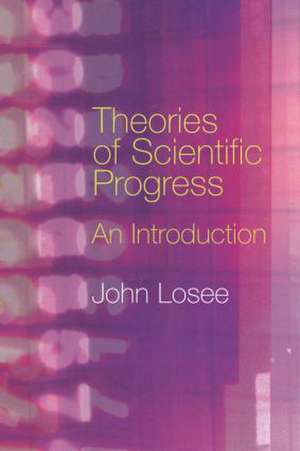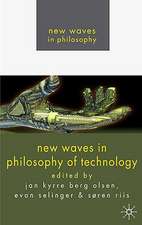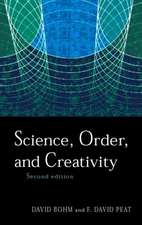Theories of Scientific Progress: An Introduction
Autor John Loseeen Limba Engleză Paperback – 30 oct 2003
Theories of Scientific Progress is the ideal introduction to this topic. It is clearly organized, with suggestions for further reading that point the way to both primary texts and secondary literature. It will be essential reading for students of the history and philosophy of science.
| Toate formatele și edițiile | Preț | Express |
|---|---|---|
| Paperback (1) | 380.21 lei 6-8 săpt. | |
| Taylor & Francis – 30 oct 2003 | 380.21 lei 6-8 săpt. | |
| Hardback (1) | 1002.26 lei 6-8 săpt. | |
| Taylor & Francis – 30 oct 2003 | 1002.26 lei 6-8 săpt. |
Preț: 380.21 lei
Nou
Puncte Express: 570
Preț estimativ în valută:
72.76€ • 75.68$ • 60.07£
72.76€ • 75.68$ • 60.07£
Carte tipărită la comandă
Livrare economică 15-29 aprilie
Preluare comenzi: 021 569.72.76
Specificații
ISBN-13: 9780415320672
ISBN-10: 0415320674
Pagini: 192
Dimensiuni: 156 x 234 x 15 mm
Greutate: 0.7 kg
Ediția:1
Editura: Taylor & Francis
Colecția Routledge
Locul publicării:Oxford, United Kingdom
ISBN-10: 0415320674
Pagini: 192
Dimensiuni: 156 x 234 x 15 mm
Greutate: 0.7 kg
Ediția:1
Editura: Taylor & Francis
Colecția Routledge
Locul publicării:Oxford, United Kingdom
Public țintă
UndergraduateNotă biografică
John Losee is Emeritus Professor of Philosophy at Lafayette College, Eason, PA. He is the author of A Historical Introduction to the Philosophy of Science (1972), which has been translated into eleven foreign languages and is currently in its fourth English Edition, and Philosophy of Science and Historical Enquiry (1987).
Cuprins
Introduction Part I: Progress as Incorporation 1. Whewell's 'Tributary-River' Image of Scientific Progress 2. Brewster on How Not To Do History of Science 3. Mill's Objections to Whewell's Historicism 4. Progress Through Reduction 5. Lakatos' Version of the 'Progress Is Incorporation' Thesis 6. Progress and the Asymptotic Agreement of Calculations Part 2: Progress as Revolutionary Overthrow 7. I. B. Cohen on the Identification of Scientific Revolutions 8. Kuhn's Taxonomic Criterion 9. Toulmin's 'Ideals of Natural Order' 10. Ideological Upheaval and Revolutionary Change 11. Kuhn's Three-Beat Pattern 12. Laudan's Reticulational Model of Scientific Change 13. Popper on Progress Through Overthrow-With-Incorporation Part 3: Descriptive Theories of Scientific Progress 14. Normative and Descriptive Theories 15. Scientific Progress and Convergence Upon Truth a. Peirce on Science as a Self-Correcting Enterprise b. Duhem and Quine on the Limits of Falsification c. Cartwright on the Importance of False Theories d. Rescher on Methodological Pragmatism and Scientific Progress e. Progress, Realism and Miracles 16. Laudan on Scientific Progress as Increasing Problem-Solving Effectiveness 17. Kitcher on Conceptual Progress and Explanatory Progress 18. Normative Naturalism 19. Scientific Progress and the Theory of Organic Evolution a. Toulmin on Conceptual Evolution b. Hull on Selection Processes c. Is the Evolutionary Analogy Appropriate? d. Campbell and Popper on Blind Variation and Selective Retention e. Does the Evolutionary Analogy have Explanatory Value? f. Ruse on the Evolutionary Origins of Evaluative Standards. Conclusion
Descriere
There seems little doubt that we have made progress in scientific theories, but how? Theories of Scientific Progress presents the arguments, covers interpretations of scientific progress and discusses the latest contemporary debates.


















